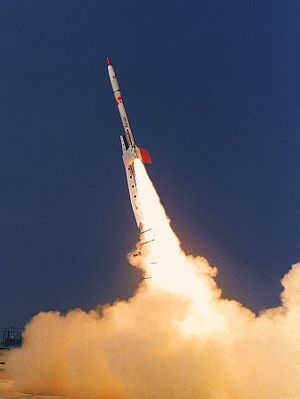On January 30, 2018, South Korea will celebrate the fifth anniversary of their first successful rocket launch. Seoul saw this achievement as an opportunity to transform its fledging space program into one capable of generating economic and military interest. However, the Korea Aerospace Research Institute (KARI)’s inadequate budget and lack of cooperation between the institute and the private industry are likely to hamper the country’s such expectations.
After South Korea’s first successful rocket launch, then-President Park Geun-hye pledged that space technology would be the cornerstone of her administration’s work. She brought forward the launch date of a lunar-lander mission from 2025 to 2020 and designated it as a central national objective. She also supported the institute’s development of an indigenous launch vehicle and rocket capability.
Why is South Korea so obsessed with the race to space? South Korea’s space research and development started late compared to advanced space programs. In 1989, South Korea had just established KARI while NASA regularly launched space shuttles and its Viking spacecrafts were racing toward the edge of our solar system. Despite this gap, Seoul sought to develop indigenous space technology because it recognized the strategic importance of the space industry.
Economically, the government sees space technology as an industry that will spur the country’s economic and technological competitiveness in the 21st century. Seoul predicts that space technology will create high-tech firms, expand employment opportunities, and stimulate other industries. It also hopes to provide cost-efficient launch options for the country’s advanced IT sector and to be an alternative launch option for developing countries.
Militarily, the government seeks to expand its space-based assets. In light of the growing North Korean missile threat, Seoul has been pursuing the “Kill Chain” program – a counterstrike capability to destroy North Korean missile and nuclear assets in the event of a conflict. This program requires extensive space surveillance and reconnaissance platforms, such as spy satellites, and an indigenous ability to place those platforms in orbit.
Seoul recognizes the strategic importance of indigenous space technology, but KARI faces two shortcomings.
First, KARI lacks adequate government funding. The institute had a budget of $583 million in FY 2015. The lunar module project alone costs $650 million and the development of rocket technology will come with an expected price tag of $1.9 billion. These projects are occupying the majority of the institute’s budget and manpower, leaving other missions and projects largely underfunded or ignored. These costs are also optimistic estimates under the assumption that every stage of projects is without technical difficulties. Space program projects are notorious for unexpected delays and subsequent cost overruns. These difficulties are likely to be more prevalent in space programs lacking prior extensive experiences.
Second, KARI lacks cooperation with private industry. The institute’s biggest private partner is Korean Air, which seeks to develop the country’s airplane industry. Despite the country’s advanced industry, we do not hear about famous conglomerates like Samsung or Hyundai investing or participating in the country’s space projects. This is in stark contrast to other countries’ space programs. In case of the United States, the public-private partnership is transforming NASA’s centers into a multiuser spaceport. The agency is developing the Orion spacecraft for missions to deep space while private companies send people to low Earth orbit. Boeing is building the Starliner, a spacecraft that will send astronauts to the International Space Station. SpaceX operates cargo missions to the International Space Station with its Dragon spacecraft and Falcon 9 rockets.
Emerging powers’ race to space will be a striking feature in coming decades. Access to space will be essential in maximizing economic and military interests for these nations. In light of this intense competition, the Moon Jae-in administration needs to significantly increase KARI’s annual budget and incentivize the private industry to invest and partner with the institute’s space projects. There is no time to hesitate. The Moon administration needs to swiftly address these shortcomings and throw its full support behind the institute’s space ambitions.
Harry Kim is a MA candidate in Global Policy Studies at the University of Texas at Austin. He is currently a Brumley Next Generation Graduate Fellow in the Robert Strauss Center for International Security and Law’s Understanding China Program and also an Applied Geopolitics Fellow at Stratfor.

































